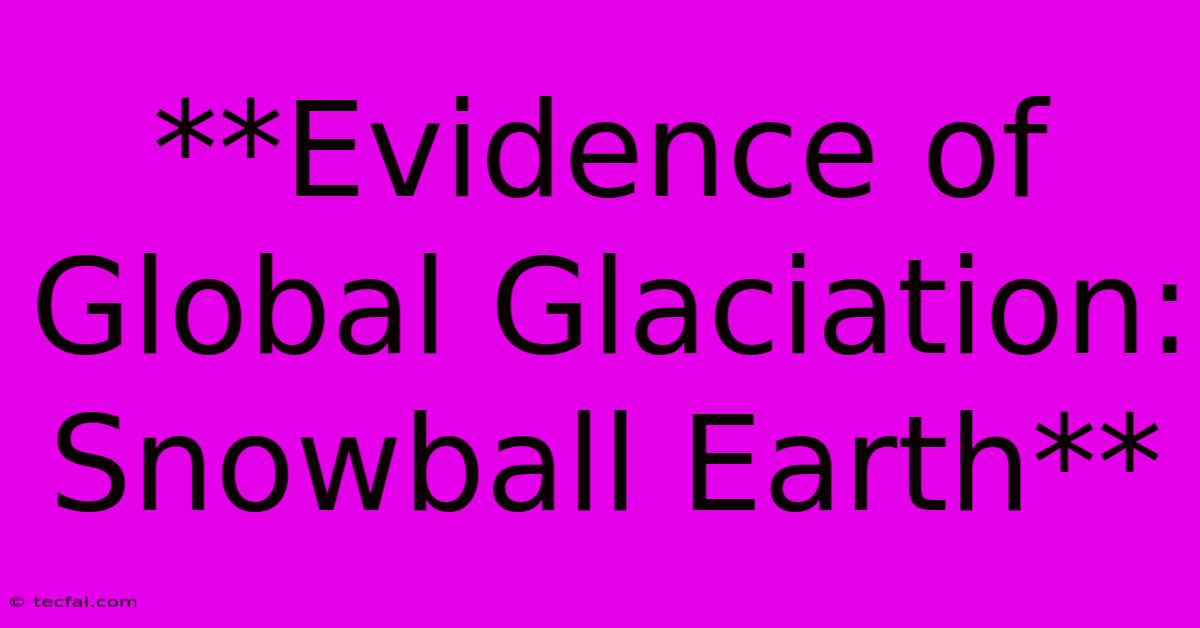**Evidence Of Global Glaciation: Snowball Earth**

Discover more detailed and exciting information on our website. Click the link below to start your adventure: Visit Best Website tecfai.com. Don't miss out!
Table of Contents
Evidence of Global Glaciation: Snowball Earth - A Frozen Planet's Legacy
The Earth we know, teeming with life and vibrant ecosystems, was once a frozen wasteland. This is the story of the Snowball Earth, a period in Earth's history where glaciers covered the entire planet, even at the equator. While it may seem like a fantastical tale, compelling evidence points to this chilling reality.
The Cryogenian Period: A Time of Global Glaciation
The Cryogenian period (720 to 635 million years ago) saw two major glacial episodes, known as the Sturtian glaciation and the Marinoan glaciation, which are believed to have resulted in the Snowball Earth conditions. These periods were characterized by widespread glaciation, extending from the poles to the tropics.
Evidence Supporting the Snowball Earth Hypothesis
Several lines of evidence strongly support the Snowball Earth hypothesis:
1. Glacial Deposits Found in Tropical Regions
One of the most compelling pieces of evidence is the presence of glacial deposits in tropical regions. These deposits, known as diamictites, are found in rocks that were formed in equatorial latitudes during the Cryogenian period. These deposits are typically composed of a mixture of poorly sorted, angular rock fragments, which is characteristic of glacial environments.
2. Cap Carbonate Deposits
Another important indicator of Snowball Earth is the presence of cap carbonate deposits. These massive, layered formations of limestone are found on top of glacial deposits and are thought to have formed when the Earth rapidly warmed up after the glacial period. This rapid warming caused a massive release of carbon dioxide from the oceans, leading to intense carbon dioxide weathering and subsequent precipitation of calcium carbonate.
3. Paleogeographic Reconstructions
Paleogeographic reconstructions show that continents were clustered together in a configuration conducive to global glaciation. This configuration would have resulted in a reduced surface area of open ocean, making it easier for the Earth's climate to become globally frozen.
4. Iron Formations
Banded iron formations (BIFs) are another important piece of evidence. During the Cryogenian period, BIFs show a shift in the iron isotopes, indicating that the oceans became depleted of dissolved oxygen. This depletion is likely due to the lack of photosynthetic activity in a frozen ocean.
Consequences of a Snowball Earth
The Snowball Earth scenario has profound implications for the evolution of life. The extremely cold conditions would have been extremely challenging for life to survive. However, it also may have been a catalyst for the evolution of more complex organisms.
The dramatic warming events that followed the glacial periods may have led to the Cambrian explosion, a period of rapid diversification of life. The release of nutrients from the oceans could have provided a nutrient boost, facilitating the evolution of new and complex life forms.
Snowball Earth: A Continuing Debate
Despite the compelling evidence, the Snowball Earth hypothesis remains a subject of debate. Some scientists argue that glaciation was more regional than global, while others debate the mechanisms that caused the warming events following the glacial periods.
Further research is needed to better understand the details of the Snowball Earth events and their impact on the evolution of life on Earth. However, the evidence we have suggests that our planet was once a frozen wasteland, offering a fascinating glimpse into the Earth's dynamic and sometimes extreme past.

Thank you for visiting our website wich cover about **Evidence Of Global Glaciation: Snowball Earth**. We hope the information provided has been useful to you. Feel free to contact us if you have any questions or need further assistance. See you next time and dont miss to bookmark.
Featured Posts
-
Winnipeg Surgery Mistake Sparks Investigation
Nov 14, 2024
-
Whoopi Goldbergs Finances Spark Backlash
Nov 14, 2024
-
National Security Concerns Uk Wind Turbine Ban Debate
Nov 14, 2024
-
Remembering Name Fashion Icon
Nov 14, 2024
-
Photos Timothy Wests Life Journey
Nov 14, 2024
